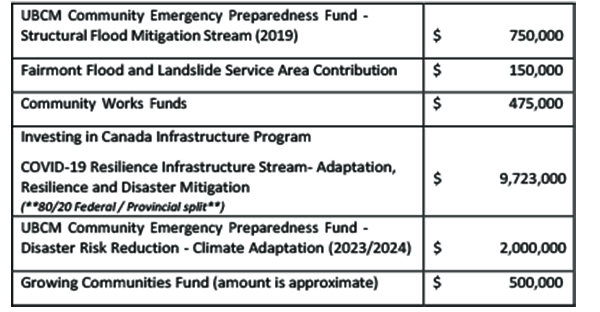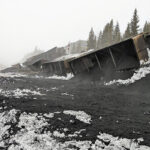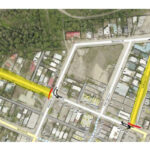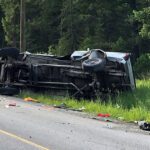Home »
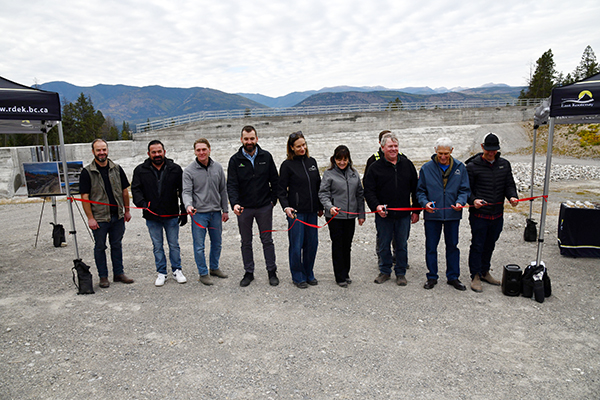
Debris Flow Mitigation Project completion celebrated
Petition delivered during ceremony asking for a review of the financial and procedural concerns
The completion of the Cold Spring Creek Debris Flow Mitigation Project was officially celebrated in Fairmont Hot Springs Wednesday, October 8, but not by all area residents.
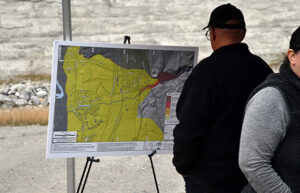 Regional District of East Kootenay (RDEK) officials, construction project leaders and valley residents were on hand for the brief morning ceremony, along with a handful of Fairmont residents who delivered a petition to Electoral Area F Director Susan Clovechok asking for a review of the financial and procedural concerns with the project, as well as assurances that there will be full transparency, accountability and resident input into all future projects.
Regional District of East Kootenay (RDEK) officials, construction project leaders and valley residents were on hand for the brief morning ceremony, along with a handful of Fairmont residents who delivered a petition to Electoral Area F Director Susan Clovechok asking for a review of the financial and procedural concerns with the project, as well as assurances that there will be full transparency, accountability and resident input into all future projects.
The project will significantly reduce the debris flow risk in the community. One of the key components of the project was the construction of a large debris flow barrier that is designed to contain 84,000 cubic meters of debris flow material, which is roughly a 300-1,000-year return period event.
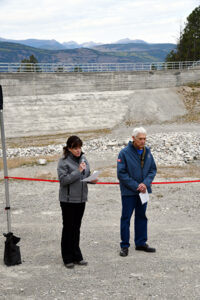
The project was launched following a landslide on July 15, 2012. Construction on the project began in September 2023.
“The Cold Spring Creek Debris Flow Mitigation project is a testament to the importance that all levels of government put on public safety,” said RDEK Electoral Area F Director Susan Clovechok.
“From the funding we received from both provincial and federal sources to the support of the regional Board, this project showcases the importance of partnership at every level in ensuring community safety when scientific evidence demonstrates that there is a significant risk to community. And none of it would have been possible without the tireless efforts and commitment of our staff, project partners and contractors.”
The barrier is approximately eight-metres tall and 135m long above the existing Cold Spring Creek channel with a three-metre-wide vertical outlet opening at the channel. The outlet includes steel bars that will capture debris but allow water to pass through. Other components of the project included a creek diversion and basin excavation, relocation and reinforcement of water lines, and creation of an access road upstream of the barrier for construction and future maintenance access.
Securing 98.5% grant funding from multiple funding programs, including significant contributions from federal and provincial sources, was crucial to the realization of the $13.6 million project. This essential financial support enabled the regional district to move forward with a project designed to enhance community safety and substantially mitigate the risk of debris flow, demonstrating the indispensable role of funding in achieving such critical infrastructure goals in small rural communities.
Funding for the project included:
“Our government is dedicated to ensuring communities are better protected from weather- related events. This project strengthens community resilience by preventing damage before it happens and avoiding costly disruptions to essential services. We are proud to have supported this project which will safeguard people, local infrastructure, and livelihoods in Fairmont Hot Springs from the devastating impacts of debris flows for years to come,” stated Stephen Fuhr, Secretary of State (Defence Procurement), and Member of Parliament for Kelowna.
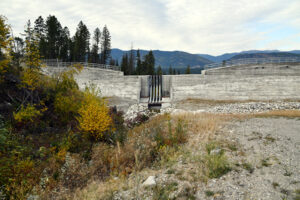 “This project is an important step toward making the Fairmont Hot Springs community safer by reducing the impacts of future debris flows. Our government is proud to invest in projects like this which will help protect people, homes and infrastructure and strengthen the community’s resilience for years to come,” added Kelly Greene, B.C. Minister of Emergency Management and Climate Readiness.
“This project is an important step toward making the Fairmont Hot Springs community safer by reducing the impacts of future debris flows. Our government is proud to invest in projects like this which will help protect people, homes and infrastructure and strengthen the community’s resilience for years to come,” added Kelly Greene, B.C. Minister of Emergency Management and Climate Readiness.
Following an opening prayer from Ktunaxa resident Janice Alpine and comments from RDEK board chair Rob Gay and Area F Director Clovechok, Fairmont resident Margo Talbot announced she was presenting a petition to the RDEK, citing concerns about increasing tax burdens on area residents.
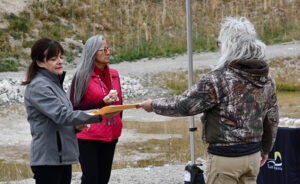
In the past three years, Talbot said, her taxes have increased by 73%.
“My taxes are now on par with other municipalities and cities, except those jurisdictions provide water, sewer, garbage collection, sidewalks, streetlights, schools and hospitals. I get none of these from my tax payments. But I do get a dam, over a tiny creek, that may or may not mitigate any future flooding if it happens in the next 100-300 years,” she said, adding, “781 residents have to pay a $1.15 million capital cost plus any additional maintenance and operating costs into the future. This is why our Local Services Area Taxes have increased by over 600% between 2020 and 2024.
“Given this impact on local residents’ taxes, you would think the RDEK would have allowed electoral assent to guide the decision-making process, instead of forcing it on us with director consent.
“There’s a phrase to describe what has happened: ‘Taxation without Representation.’ For this reason, we are here today to deliver a petition signed by hundreds of residents to our local RDEK representative asking for a review of the financial and procedural concerns arising from the Cold Spring Creek Debris Flow Mitigation Project, as well as assurance that there will be full transparency, accountability and resident input into all future projects.
“The time of profligate spending is over,” Talbot said. “We just came out of the biggest financial boom in the history of mankind, and yet, every level of government is either broke or in debt. We need to closely monitor and map out our local financial ecosystem to ensure that we are not paying for unsustainable infrastructure or excessive schemes into the future.”
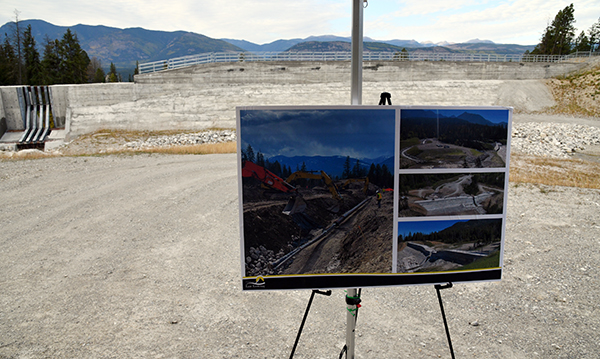 Lead image: Pictured left to right: Brett Allingham (Mackay), Rob Mackay (Mackay), Colin Van Andel (Mackay), Joe Croxon (Mackay), Kara Zandbergen (RDEK Project Supervisor, Flood Mitigation and Water Resources), Susan Clovechok (RDEK Electoral Area F Director), Brian Funke (former RDEK Engineering Services Manager), Rob Gay (RDEK Board Chair), Kevin Mohr (McElhanney). Ian Cobb/e-KNOW photos
Lead image: Pictured left to right: Brett Allingham (Mackay), Rob Mackay (Mackay), Colin Van Andel (Mackay), Joe Croxon (Mackay), Kara Zandbergen (RDEK Project Supervisor, Flood Mitigation and Water Resources), Susan Clovechok (RDEK Electoral Area F Director), Brian Funke (former RDEK Engineering Services Manager), Rob Gay (RDEK Board Chair), Kevin Mohr (McElhanney). Ian Cobb/e-KNOW photos
Ian Cobb/e-KNOW
